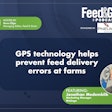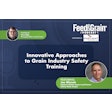
Carol Jones, Ag. Engineer with CL Jones Consulting, LLC and Professor Emeritus and Buchanan Chair, Biosystems and Ag Engineering at Oklahoma State University, joins Steven Kilger to talk about the safety training, Basic Response to Grain Handling Hazards, she helps teach about grain handling safety, engulfment and entrapments.
Jones and the other course instructors travel throughout the United States, with a trailer that is capable of simulating a grain entrapment. The trailer gives trainees a chance to participate in a grain engulfment as both the victim and rescuer.
The audio is a little rough, but the conversation about why hands-on training is important to get across the real danger of grain. We also talk about Lockout/Tagout, overcoming complacency and much more.
See the full transcript below.
Steven Kilger (0:00)
Hi everyone. Thank you so much for listening to the Feed & Grain podcast. My name is Steven Kilger, managing editor of Feed & Grain Magazine.
I'm sitting here talking to Carol Jones. You may have noticed her from other parts of the industry. She's at the GEAPS Exchange almost every year doing safety training with her, you may have noticed it, her giant trailer for grain engulfment and safety training. And she's here with me today. And I just want to say, thank you so much, Carol.
Carol Jones (0:28)
Thanks for having me. I really appreciate you inviting everyone today. And it's a real honor to work with the industry, we've had a lot of good times out there with a trailer and just going around the country and working with the industry is our privilege. They're the best people in the world.
Carol Jones (0:47)
Yes, they really are, aren't they is a great industry to talk to and be involved with. My question is how did you get involved with safety training in the industry. I always think to myself, Oh, I'm how did I end up writing about the industry. But you're going around doing training. You're so involved with all aspects of it.
Carol Jones (1:11)
It's really amazing where your career can take you. I was raised in the ag industry, a farm girl from northwest Oklahoma. And it was a natural fit, but I worked a lot of years in the oil fields with different kinds of product handling pumps, compressors, tires, just all kinds of material handling. Fast forward, we know what happens with oil, just up and down and my family needed me to return back out to the farm for the next year I manage Family Farm things. So I headed back out to the barn and raised a daughter who's now an Engineer and raising two granddaughters. So lucky me, she also married an AG engineer, so we've got a whole house full of engineers. And maybe two more coming on.
Carol Jones (1:55)
Working with the ag industry again, still felt like there was a part of my education I didn't get. And so I had an opportunity to teach high school for a little while in the ag area in Oklahoma where we think wheat, a lot of wheat, and grains of all kinds. As I did have an opportunity to that teaching connection, to go back to OSU and finish my Ph.D. I grabbed that opportunity in a hurry. That was Ph.D. there at OSU. And they asked me to stay and take Dr, Ron Noises' position, some folks out there may remember Dr. Noise in the grain industry. And that sort of set me on the track to go back to my roots of material handling in the ag industry. That led me to the things that happened was grain, particularly when it goes out of condition. And that is directly related to safety. That's where we are today.
Steven Kilger (2:56)
Poor quality grain really that's the root of a lot of our problems.
Carol Jones (3:01)
Keep the grain in good and people don't generally don't go in the bin very often. And that reduces our risk of entrapment and entanglements and engulfments, and breathing bad gases and all those ills that we find every day.
Steven Kilger (3:18)
Your no longer a professor though right? Or are you still teaching?
Carol Jones (3:21)
I teach occasionally, I did retire after 20 some odd years at OSU. To get an opportunity to be a trainer for Fire Service Training at OSU with one of the world's premier groups that goes around training about all different kinds of fire service all over the world. And that's where our trailer is housed. Our funding comes through OSHA through grants. And then they pay me now and again which is kind of nice too. Working with them, they've got an elite group of trainers that does this kind of training as well as confined space training and everything that a fire department would need to know. So I'm real privilege to get to work with them and do the parts of my job that I really love to do. I don't sit in faculty meetings anymore. That's pretty nice.
Steven Kilger (4:20)
Full disclosure, everyone I've talked with Carol before, and you've always sounded busier than I am I'm not any part retired.
Carol Jones (4:32)
I like to say, I don't think you quit working. You just didn't say no to the things you don't want to do. I'm doing the things I do want to do now.
Steven Kilger (4:40)
You've worked with people across the industry now for years? What leads to safety incidents, when you're moving grain?
Carol Jones (4:50)
There are really two times that it happens. One is when our grain does go out of condition and we're trying to move grain out of the bin and it just won't go down to the reclaim system. So we need to break up the clumps and when the grain goes out of condition it may be stuck to the wall and may have a bridge, it may just be huge chunks that won't go down to that reclaim. So someone goes in there to break that up, so we can get the grain out of the bin. The other time is when we're cleaning out that bin, getting ready for the next year's harvest. And we'll be doing that here pretty soon. Hopefully, our incident rate doesn't go up this summer, but it has every year before now. So, I guess I want to be optimistic that as we clean out those bins, people go in at the end, to get the sweep auger and maybe we haven't Lockout/Tagout. That's just something that I've really been talking to people a lot about lately is Lockout/Tagout, even if we don't have an entrapment or engulfment. We step down in those unguarded sumps, and then we have an entanglement. It can sure change a life in a hurry. But all of that really comes from bad grain. When the grain won't come out to reclaim system, that's when we go in the bins. And that's when bad things happen.
Steven Kilger (6:08)
Have you seen that movie Silo, that came out a few years ago about a grain entrapment? It was interesting because it's a dramatization of it, but as I was sitting there watching, I'm thinking the whole issue could have been solved with a simple Lockout/Tagout system.
Carol Jones (6:28)
Probably the same thing. Lockout/Tagout is something that we just really need to pay attention to make our job a little longer. If we can't Lockout/Tagout we've got at least guard the sump. Lockout/Tagout is part of the grain handling standards. And we don't want that grain moving on the inside, so Lockout/Tagout is the answer. It's one thing to turn off the auger, de-energize it, but to go ahead and lock it out so another employee doesn't come along and say, "Oh yeah, we're supposed to be moving grain today" and turns it back on.
Lockout/tagout is so important. If we can leave the air and the lights on, and still do Lockout/Tagout that's a good thing to do. But if it's all wired in together, then everything has to be shut off in order to de-energize the augers and anything that moves the grain in the bin. That continues to be our big problem. Other than bad grain in the bin, but some years we don't have anything but bad grain to put in the bin. So we can't help but have some clogs and stuck grain, But the mechanism of Lockout/Tagout keeps our grains from moving when we're working inside the bin. That's the best way that I know of to make sure that grain doesn't fall down on us other than just staying out of the bin completely.
Steven Kilger (7:56)
We're getting closer and closer to hopefully that being an affordable option for everybody to kind of stay out of their bins at all times. And from what I've noticed it's complacency, right? They've been in a bin a bunch of times before, so you go in again. This is part of the reason I think the trainings you guys do with your grain engulfment trailer, are so important because it allows people to kind of get the experience and something like that happening.
Carol Jones (8:32)
It's a safe environment. So far we have a hundred percent recovery rate of getting everybody back out of that time. And we're proud of that! Yes, we do get complacent. I used to think that the more seasoned employees were safer than our brand new employees but I'm not sure that's true. Because we get lackadaisical about what we do we've always done it this way and never happened to me and until it does that day.
But we can't be complacent, we do need to understand that, especially with our new equipment now, we move grain so much faster than we used to. As a kid I played in the grain bins just like every other farm kid that we moved grain at a bushel and hour.
Now we can move up to 40,000 bushels an hour and so there's just no one that has a chance when we're making grain that fast. You can't protect yourself. So those of us who have been around the industry for a while and have this false sense of security rate need to reassess. And the trailer kind of helps you do that. Obviously, it's not what I'll say is a completely realistic situation down in the trailer because we you pellets, for example.
They're very grain-like, but they aren't exactly the same. And all the equipment is easy to access, and quickly have light in there and we can hook up a fan. That's certainly not what it's like in a grain bin. But it does open some people's eyes when they're entrapped in some kind of material, and they are totally helpless. And we put a cofferdam around them. And sometimes they find out, they're a little claustrophobic and they didn't know that. Some surprising things can happen even to those of us with a lot of experience.
Steven Kilger (10:21)
How could you not be claustrophobic afterward? The training itself, so you guys get part of your funding from OSHA, part of your funding from the university, and go around putting on these demonstrations. Can private companies hire you for the training?
Carol Jones (10:46)
We have funding through OSHA. And as long as the funding is available, and we haven't used it all through the year, we can do this training for free. After that, we do have to charge.
Carol Jones (10:58)
Universities provide some funding for us, the trailer actually was provided through the assistance of the firefighters' grant, along with that half-million dollars worth of equipment, and we appreciate that funding to continue to do what we do. We rely on that OSHA funding and then on people paying for it once we run out of money.
Carol Jones (11:22)
It's an eight-hour day when we come. We bring the trailer and we usually have four or five instructors. The first four hours of classroom instruction. And that's not everybody's favorite card today. We do have to talk about equipment and air monitoring, about standards, about governmental regulations, about why grain goes bad in the first place and what everybody's role is in a rescue or in staying safe.
Carol Jones (11:50)
And then in the afternoon, we do four hours out on the trailer. That's the part we like, we do an engulfment with everyone. We'll have two rescuers, which are our students. And one victim down in the trailer and we rotate that out. We do a segment of knot tying and things we can do if we don't have a tripod available and have to rig ladders as an anchor point. We do talk about anchor points, we talked about different kinds of coffer dams, we talked about walking on grain.
If you don't have something to stand on, you're gonna wear yourself out really quick walking around. So we talked about different options, to stay safe when you need to walk in grain, and either to do your job or get down to a victim.
Carol Jones (11:50)
So it's a lot of fun the trailer is a lot of fun. Our favorite scenario is to have firefighters and elevator workers and farmers all training together. That way, everybody knows what everybody else knows. And they get a different perspective from each one of those groups. And that's just a fun day.
In fact, it was Friday, we just got back from West Texas. And we did three days there in West Texas, and we had that combination of people in Denise, Texas on Friday, and it was really a great training.
Steven Kilger (13:13)
Great, part of the challenge is training those local rescuers, the fire crews that will come out and hopefully save your life.
Carol Jones (13:26)
Getting them to understand that the elevator environment is just essential. Many of them have never been in a grain elevator, they have no clue what that environment is like, and they don't understand the physical properties of grain and how different that is from any other material they work around. So it gives them that opportunity, an opportunity to meet the ag people in their world and interact with them and understand how important pre-planning is.
Gives them a little different perspective on their job. Hopefully they never need it. We just hope that nobody ever needs this training. We'd love to be out of business. But that hasn't happened yet.
Steven Kilger (14:09)
Unfortunately, it will happen in the near future at least.
Carol Jones (14:17)
Accidents happen and sometimes we do stupid things.
Steven Kilger (14:23)
I'm a woodworker as a hobby and I've done stupid things in the shop and I know we shouldn't do, and you just kind of go, "Oh that was close."
Carol Jones (14:32)
I think we've all been there.
Steven Kilger (14:34)
That's why I find it so amazing, your training. Because you also get both sides, you get to be engulfed and you also get to be one of the rescuers. And you kind of see what both sides of them are feeling at a given time because that's part of the issue. You panic when you didn't that situation and it's important to know.
Carol Jones (14:58)
That's true, it does. And the things that you have to do to get someone out of that situation also help you to understand how dangerous it is. And what you can do to keep from getting in a bad situation like an engulfment or entrapment that students who aren't down in the bin, because we only use three at a time in the bin.
Carol Jones (15:19)
The rest of them are up on top of the trailer and they're handling the equipment for our rescuers. They're learning about the rope system that we use, and how extensive the equipment requirements are.
The equipment requirements for engulfment or an entrapment rescue are so extensive, that it's really difficult for one fire department to have those resources, and does the ag community find out how they can help their fire departments and how they can bring other fire departments together so that everybody works together.
We can achieve a good outcome when we did have something that happened. It may take 125 or 200 people to do a rescue, there are so many different things that have to happen. And so we talked about that. And I think our students understand that this is not just, a hurry up and run in there and pull somebody out of the drain scenario.
Steven Kilger (16:18)
Because the moment you do that, you start to put yourself at risk.
Carol Jones (16:20)
It happens, where the victim was one of our rescuers. We don't want to see that happen.
Steven Kilger (16:30)
I would encourage anyone who's listening right now to what is the official name of the grain trailer ...
Carol Jones (16:38)
Or class is called, Basic Response to Grain Handling Hazards. At the osufst.org site. You can find information about our class, or would like to contact me I can certainly give that information to them. My email address is [email protected]. And I'll be glad to direct you to more information.
Steven Kilger (17:08)
Yeah, I really encourage anyone to let your managers know that you guys would like to have some training like this because it really is invaluable. One of these days, they'll invite me along and I'll get to that trailer as well.
Carol Jones (17:25)
Well, next year, you should be the victim, how's that?
Steven Kilger (17:28)
Oh, excellent. I'm good at playing the victim.
Carol Jones (17:34)
That's the best part of being a victim and hoping everybody does their job quickly and gets you out in an extra fast time.
Steven Kilger (17:43)
It is one of the things I love for everyone in the industry to get get your training at some point because, especially covers industry, and I'm a little more may be plugged into the day to day of it, but you'll see grain engulfments still way too often. It's tragic every time.
Carol Jones (18:00)
It is, and it just doesn't have to happen. It just really doesn't. We're an industry that has so many resources and so many good people with all kinds of great ideas and, and we just can't tolerate this to continue. We shouldn't have to we can make this get better. That's kind of what our training is about as part of the knowledge base that we're trying to assemble and project out onto the industry. And I'm just convinced we can make this better
Steven Kilger (18:30)
I think so too. And it's always great to see grain handling companies kind of taking a lead that kind of thing. You see them donating equipment to their local fire department, having safety days and all of that. Always really, it's really good to see.
Carol Jones (18:47)
It won't happen without that support. Nobody else going to do it for us, we've got to do it as an industry. Many of our incidents happen out on the farm, and that's the hardest group to reach. Those local coops and Farm Bureus and other AG groups where the farmers are interested and have a stake in that organization. I like to talk with wives because they're really interested in keeping their children and their husbands safe. So that's a good way to reach out to people. It really has to be a grassroots effort. It has to happen at the community level. Though the insurance company has played a big part in promoting safety and having the equipment down at the grassroots level. And that's really important.
Steven Kilger (19:41)
Hey, guys the message today is to get educated, learn about grain safety, learn about entrapment safety and finally be safe.
Carol Jones (19:51)
Exactly, be safe and don't go in the bin and if you do have to do it in a safe way. Lockout/Tagout.
Steven Kilger (19:58)
Yeah, so important. Let's try and make it so no one gets entrapped or engulfed throughout the year.
Carol Jones (20:07)
It would be great if our account is zero next year, that would be a wonderful year, I know it probably won't happen, but that's our goal.
Steven Kilger (20:16)
I'm sure you get the same study from Perdue, where they go to the yearly reported accidents. It's getting better but ...
Carol Jones (20:25)
But it could be better. All it takes is one wet year in the Corn Belt, and or incidents will go back up. It happens every time. We hope that this is a good harvest year for everyone to get ready for harvest, do that in a safe way. And everybody goes home to their children and their loved ones at night. And we live another day to have a successful day in the grain Industry.
Steven Kilger (20:48)
Exactly. Well, thank you so much for talking to me today. I really appreciate it. And I'm sure if our audience is interested, we will have your email in the show notes and some more information on what you do. Oh, thank you so much. We will. We'll talk soon hopefully you can come on again. We can talk a little bit more about confined space entry training, all the other training that you do and some information about where you've always been so ...
Carol Jones (21:22)
We can get them more specific about topics and give them a deeper understanding when that time is available, and we'll be right back.
Steven Kilger (21:34)
All right that sounds great. Thank you everyone for listening. In and we will see you next time. Have a great day.
.jpg?auto=format%2Ccompress&crop=faces&fit=crop&h=48&q=70&w=48)














